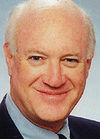Steve Crocker
| Country: | USA | ||||||
| Email: | steve [at] stevecrocker.com | ||||||
| LinkedIn: | |||||||
| |||||||
Dr. Steve Crocker is the Co-Founder and CEO of Shinkuro, Inc., the former Chair and Vice-Chair of the ICANN Board, an Internet pioneer, an early leader of ISOC and the IETF, and the creator of the RFC document series.[1][2] He continues to speak about, and participate in, the development of the Internet through Industry conferences and meetings.[3]
He is the brother of Dave Crocker, who is well known in the Internet Industry for his early work developing Email technology.
Internet Pioneer
RFC
Steve Crocker was a graduate student at UCLA in the late 1960s and 1970s, and along with Vinton Cerf and Jon Postel,[4] was part of the team that developed the protocols for the ARPANET.[5] Steve was the humble man who wrote the first RFC, or Request For Comments, a document series wherein questions and answers to the pressing technical issues were presented to and by the entire engineering and infrastructural community. Dr. Crocker labeled the first memo as such as he did not want to seem presumptuous or authoritative, but rather facilitate discussion and progress within the community.[6] The first RFC was published April 6th, 1969; and it can be read here, Steve's retrospection on the beginning of the series on its 40th anniversary can be read here. The topic of the first RFC was host software.[7]
The RFC series began before the network was actually working, and before email was possible. Thus, they were physically mailed to each research center, and then circulated.[8]
Beginning
Dr. Crocker attended the same high school in southern California as both Jon Postel and Vint Cerf,[9] and he has described Vint as his best friend.[10] In 1965, while at UCLA, Steve began working on an ARPA supported project, which was a precursor to the actual ARPANET.[11] The project dissolved, and the remaining DARPA funds were transferred to Gerald Estrin in the Computer Science Department; Steve began to work for him in 1966. In 1967 he was at MIT working on more graduate studies, but within a year and a half he had returned to UCLA. He was drawn to MIT given their Artificial Intelligence programs. In 1968, he was back at UCLA, and given that his friend Vint was looking to enroll in a graduate program, he introduced him to Estrin; shortly thereafter Vint was a part of the school's graduate program. That summer they were both working on the ARPAnet project. By 1970, he had been given a job with ARPA in Washington, D.C., rather than the previous position as a graduate student engaged mainly at the UCLA campus. He was now Program Director, and managed protocol, various network sites, and contractors spread throughout the U.S., and he was also required to travel to Europe. While at DARPA he pursued research programs in artificial intelligence, automatic programming, speech understanding, and network research.[12] Within the next few years he was working extensively with another well-known Internet Pioneer, Robert Kahn.[13]
In December, 1970, Dr. Crocker created the Network Control Protocol, which was the original host-to-host protocol for the ARPANET. It allowed 3 disparate networks, in this instance the computer network, a packet satellite network, and a packet radio network, to interoperate.[14]
The organization and communication work involved in the RFC series, the interoperability of the first network sites, and his position as Program Manager led Steve to found the Networking Working Group, and he asked Vint to be its first Chairman;[15] the group is the predecessor of the Internet Engineering Task Force.[16]
An extremely detailed interview with Steve can be found here; It is largely technical, but does shed some interesting light on the development of the Internet.
Other Early Work
Dr. Crocker taught classes at UCLA on computer programming for the IBM 7094 mainframe computer; the course was specifically adressed towards high school teachers, with the goal of teaching digital processing and assembly language programming. The teachers would then be able to bring this knowledge back to their classrooms.[17]
Career & Entrepreneurialism
Steve has founded and run a number of companies. He founded and was director of the Computer Science Laboratory at the Aerospace Corporation from 1981 to 1986.[18]
In 1986, he became Vice President of Trusted Information Systems; he established their L.A. office and ran in until 1989, when he relocated to the Maryland office. His main responsibilities were program verification research and application, integration of cryptography with trusted systems, network security, and new applications for networks and trusted systems.[19]
Steve is the co-Founder and CTO of Cybercash Inc., Founder and Director of Executive DSL, and co-Founder and CEO of Longitude Systems. CyberCash is an online payment company, Executive DSL is a DSL ISP, and Longitude Systems was a provider of Operational Support Systems.[20]
Current Work
Dr. Crocker is CEO and co-founder of Shinkuro, Inc., which is focused on dynamic sharing of information across the Internet.[21]
He has been involved in DNSSEC deployment efforts.[22]
ICANN
Steve Crocker has been involved in both the Internet and ICANN since their beginnings. He is a member of SSAC, was the former chair of ICANN's SSAC, starting in 2002, and the SSAC's non-voting liaison to the ICANN Board until he was selected by the NomCom to serve as a voting member. He was selected by the NomCom in 2008 until the 2014 AGM. Following the annual meeting of 2010, Steve was elected as Vice-Chair of the ICANN Board.[23]
Following the departure of Peter Dengate Thrush after ICANN Singapore in June 2011, Steve Crocker was unanimously appointed to act as Chairman of the Board. His current term is still set to expire at the 2011 Annual Meeting to be held in Dakar, Senegal. Bruce Tonkin was elected vice-chair.[24] Mr. Crocker was re-elected to another term at ICANN 42 in Dakar,[25] and is now set to step-down following the 2014 Annual Meeting.[26]
Thus, given that Steve Crocker has been a member of the ICANN Board since 2008, he has been heavily involved in developing ICANN's new gTLD expansion program and is set to launch the program. In January 2012, following weeks of protest from anti gTLD groups, such as The Association of National Advertisers and related groups, and bad press from the New York Times and Washington Post, and hearings by the U.S. congress to address high-level concerns with the program, and talk of the Board meeting to discuss delays; Steve Crocker announced that the program would continue as scheduled, and launch January 12th, 2012. He noted that any delay would compromise ICANN's integrity and call in to question its preparedness and its exhaustive processes that created the program; he underscored the fact that ICANN can not be seen as beholden to political interests, specifically U.S. political interests.[27]
Conflicts of Interest
After passing a substantial Conflicts of Interest policy in 2011, Steve Crocker has excused himself from voting on certain issues as per that policy. One notable occasion occurred in February 2012, when 7 board members abstained from voting or participating in the conversation regarding a motion related to the new gTLD program and the Board's commitment to the second round of new gLTDs. Mr. Crocker had previously voted on issues related to the program, and his self-identified conflict seems to have been a first. He has previously noted that Afilias has invested in his consulting firm, Shinkuro.[28]
Awards
Steve Crocker was recognized for his pioneering work by the IEEE, with their 2002 Internet Award “for leadership in creation of key elements in open evolution of Internet protocols: Network Working Group, Request for Comments process and layered protocol approaches".[29]
Education
Dr. Crocker earned his BA in Math (1968), and PhD in Computer Science at UCLA (1977), and he studied artificial intelligence at MIT.[30]
Videos
Crocker is interviewed by Gray Chynoweth at ICANN 42 in Dakar, Senegal, on the topic of New gTLDs and IDN in the developing world.
References
- ↑ ICANN.org
- ↑ tools.ietf.org
- ↑ Prensa.LACNIC.net
- ↑ Alpha.geek.nz
- ↑ ICANN.org
- ↑ NYTimes.com
- ↑ Google Timeline
- ↑ NYTimes.com
- ↑ Vint-Cert.co.tv
- ↑ CBI.UMN.edu
- ↑ CBI.UMN.edu
- ↑ NetworkSorcery
- ↑ CBI.UMN.edu
- ↑ Packet.cc
- ↑ CBI.UMN.edu
- ↑ ICANN.org
- ↑ PIR.org
- ↑ NetworkSorcery.com
- ↑ NetworkSorcery
- ↑ Sinkuro.com
- ↑ ICANN.org
- ↑ PIR.org
- ↑ ICANN.org
- ↑ DomainNews.com
- ↑ Crocker Bio, ICANN.org
- ↑ General Board, ICANN.org
- ↑ ICANN Chairman Sees Little Value in Delaying New Domain Name Program, NationalJournal.com
- ↑ Seven ICANN Directors Have New gTLD Conflicts, DomainIncite.com
- ↑ PIR.org
- ↑ PIR.org

